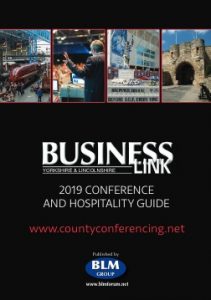Whether it’s a celebratory dinner, an AGM or a seminar, there are certain aspects everyone needs to consider when it comes to organising an event
Over the course of this guide we’ve got a host of inspirational ideas on how to make sure your conference runs smoothly – but whether it stands out from the crowd and brings you success in the long run is entirely down to you. The facilities in our region are of such high quality, and staffed by such knowledgeable people, that you can be pretty sure your event will be well-organised and run smoothly… but that doesn’t mean it won’t be boring!

© Shutterstock / Matej Kastelic
Most people in business find themselves being invited to umpteen conferences each year but it would be a fair bet that most of them fail to stick in the memory. The least successful are probably those where delegates have dragged themselves to the venue from near and far, only to find the entire programme consists of people reading out speeches that they could have easily sent the guests via email, possibly accompanied by some unintelligible graphics if you’re lucky. Watch out too that your speaker line-up doesn’t replicate a similar recent conference, or guests could well experience some unwelcome déjà vu.
On the other hand, equally useless are those which include too much content. Booking as many speakers as you can may justify the price of the tickets, but if that means each one only get a few minutes to pass on their message, which gets lost in a barrage of facts and figures, it hardly seems worth them attending.
Conferences and events are a social occasion as well as the chance to impart information, and if the programme is so packed that there’s no time to network or simply swap business cards with the person sitting next to you, it’s a wasted opportunity. Leave too long a break between sessions, however, and guests could begin to drift away.
Here are some aspects to keep in mind, but this entire guide is filled with inspiration and ideas. Remember, the goal is to hold an event that will be interesting, useful to the audience and memorable.
Test the room
There’s nothing worse than going to an event and realising that you’ve been unfortunately placed and can’t actually hear a word of what the main speaker is saying. Most conferencing venues will have good acoustics, but that doesn’t excuse speakers failing to project their voices properly. Remember that even if answering a question from the audience, or speaking in general, it is best to project your voice towards the centre of the room rather than turn to answer a person in a far corner.
Beyond that though, it’s often useful to visit the venue in advance and have a colleague stand at the back of the room, so you’re able to see how loud you must be to be heard.

© Shutterstock / sirtravelalot
Memorise it by heart
While there’s no denying that cue-cards and scripts are valuable for those unfamiliar with public speaking, and should be used to help jog the memory. Ultimately there’s nothing worse than seeing a speaker fumbling over what they are saying, or forgetting entirely. Confidence is always going to be a major factor in what sells a company, and a speaker should exude confidence – even if they don’t feel it. Learning the entire speech off-by-heart, and practicing it in the mirror or to family, will help a speaker feel more confident in what they are saying.
Don’t rely on technology
It can be easy to look at all the latest technology available, and while it can be tempting to rely on power point presentations or videos to handle some of the work – it’s not always the best idea. Ultimately it is people which sell products or services, and the ultimate goal of a conference or seminar is to get more customers. The audience wishes to know that the individual, the very person whose services they might be paying for, is a skilled and knowledgeable expert that they can rely on.
Relying too heavily on technology also opens one up to problems when things go wrong – as they inevitably will. Seeing people fiddling around with projectors or laptops does little to inspire confidence.
Stick to what you know
Ultimately the entire speech should be on a topic you are familiar with, to attempt otherwise will invite disaster if the audience asks any difficult questions. Keep in mind that the goal for the event is to get more customers for your services and yours alone. If you keep on track with what you know, and what advice you would give to a client across the table – then the seminar will be stronger, and you’re much more likely to get good results.


